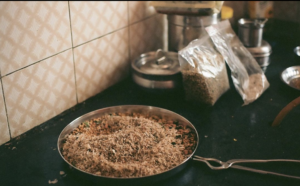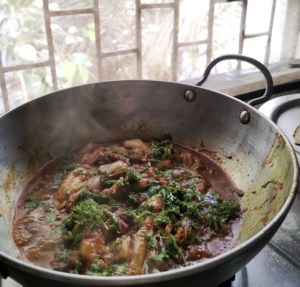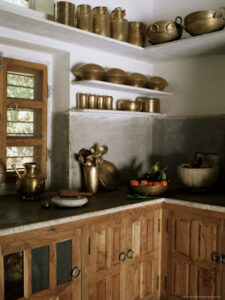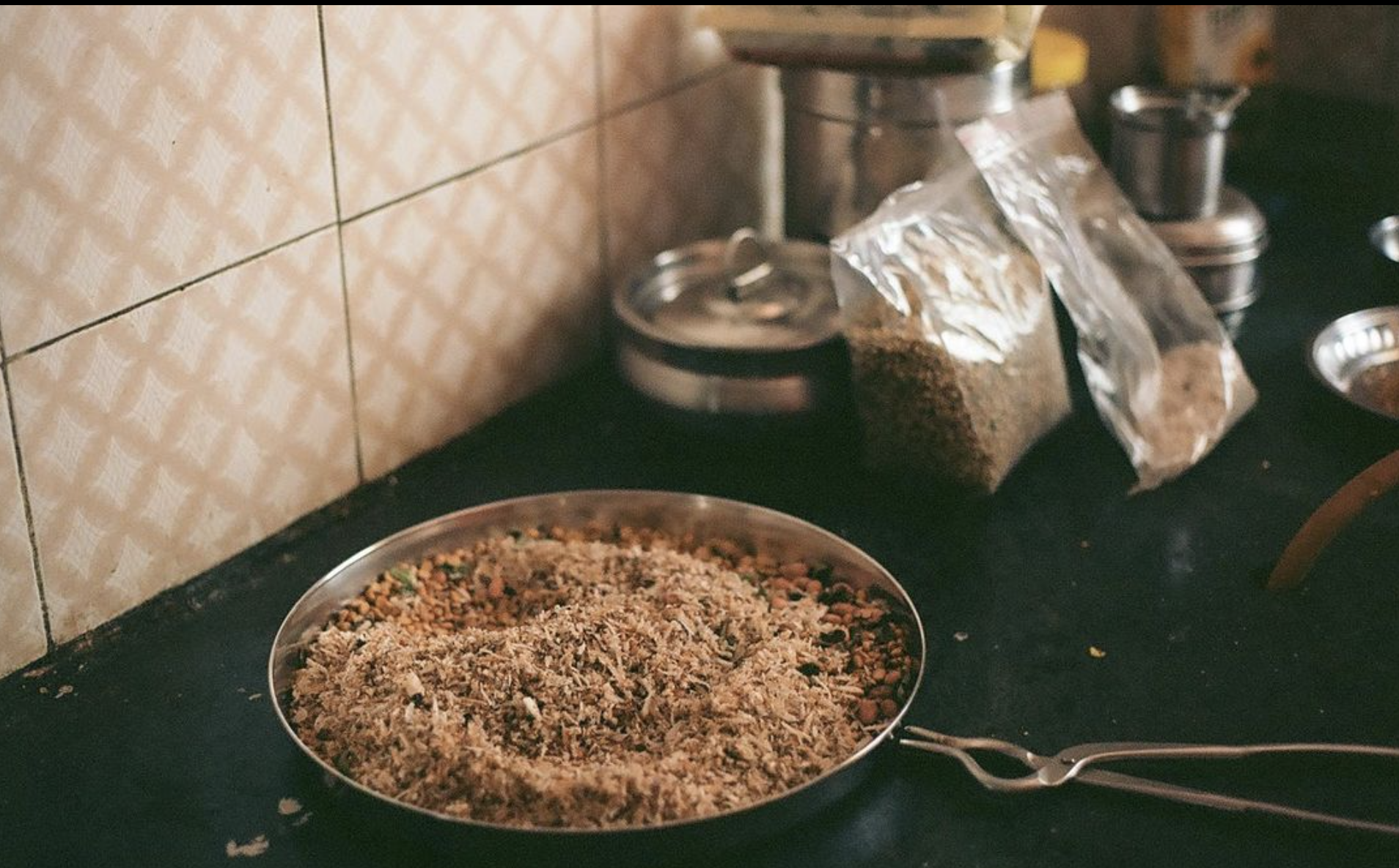Heat as a rite of passage in the kitchen.
Around the age of twelve, I expressed a desire to learn cooking. “Want to learn to cook?”asked my mother, as she handed me a damp yellow kitchen cloth. “Start with learning how to clean.” I held the cloth like it was radioactive and wiped the kitchen counter with such disgust that I didn’t graduate beyond cleaning duties for the next decade.
For a long time, my mother’s kitchen was a place of authority and rigid control. If you wanted to help, you had to do just as she wished, or not at all. My mother has always ground her masalas from scratch, detested spillage, had a personal vendetta against crumbs,and stored her linens with one sachet of sandalwood powder and three moth balls per shelf. Nothing ever changed, no matter how many houses we moved. Any mess or broken crockery would create a cloud of tension that began in the kitchen and swiftly engulfed the house.
This is probably why I felt comfortable in my grandmother’s kitchen, where Paati liked to talk as she cooked, her soft voice drifting across the shelves, asking me to hand her this or that. I felt comfortable enough to lean against the counter, often taking in the smell of decoction or dipping my hands into a steel vessel full of karuvadams, while listening to a sermon on the benefits of bananas or a sturdy handbag. I loved how Paati made cooking seem effortless and inclusive, like your presence was just as important to the food as a jar of salt.
If my mother’s kitchen was fire, my grandmother’s was all warmth.

Throughout my twenties, my relationship with the kitchens I knew were based on my interaction with the cooks that flitted in and out of them. There was Priya who spoke to me about grocery requirements (“kaanda khallas ho gaya,”), Chaya, who sang in Bengali as she concealed thinly sliced chillies in aloo choka. There was Neelima who brought in half a kilogram of intrigue with every plastic packet of jhinga; and Santan Mary who taught me the secret to tender, patient mutton (“five whistles of the pressure cooker then slow cook for ten minutes without the weight.”).
I spent years dodging the idea of actually cooking, by sticking to a limited repertoire of potato fry and rasam. The kitchen was never a place I wanted to linger in endlessly. I had neither the time, nor the inclination to learn to make myself a meal.But years of living on my own and coming back to cold, unappealing dinners, subsisting on greasy takeout, and falling sick with no one to hand me a soothing plate of comfort food, made me realise how under-qualified I was as an adult. And that to be truly independent, I would first have to learn to feed myself.
I slowly began to teach myself to cook in fits and spurts. Cooking was cute on Masterchef Junior, sensuous with Nigella, thrilling thanks to Anthony Bourdain, and meditative when inspired by ‘Jiro dreams of Sushi.’ But I found that for novices like myself, the kitchen is a place of heat: and cooking is a war, fought in matchsticks that won’t light and flames that leap, facing the bullet-like splatter of mustard seeds in hot oil, taking cover from sizzling pressure cookers, yelping at the angry heat of steel ladles.[c] It is burning tongues with a drop of “let me taste that rasam first,” getting scalded with papad oil, singed by steaming dosa tawas, in torrid temperatures with a slowly flaring, easily combustible temper.
In fact, I believe that you can spot a seasoned cook by their tolerance to heat. They have fireproof fingers that hold searing iron pans without the trace of a wince. They can be identified with brown-black tattoos on their wrists and arms from years of being splashed by boiling oil and burnt by hot vessels.

Although I’d finally started to find my way around my kitchen, I was still daunted by its heat. But, in the thick of the lockdown, when Paati died, I couldn’t join my family to mourn her passing. Instead I clung to cooking as a way out of my misery. I found it impossible to read or work, and only cooking felt right. There was a rhythm to the process of making slow-cooked mutton curry and arachuvitta sambaar that felt reassuring and comforting. I chopped, cooked ,and boiled, thinking of tips Paati liked to give me, “less salt is better than too much,” “red chillies for those who like less spice”. Or the way she used Tamil to describe food with the playfulness of a child or the economy of a poet — in “moru-moru” rice and “flower-soft idlis”.
I attempted everything from eggplant stew to an elaborate aubergine biryani. I learned to become comfortable massaging the marinade into mutton chops and pomfret all in an effort to forget and remember in that obtuse pattern that grief follows. In Bangalore, my mother coped with her loss similarly, cooking food my grandmother liked to eat. Every so often, she’d call me to tell me she’d made jackfruit payasam or Paati’s favourite kind of vadai for tea. In return, I’d Whatsapp her pictures of my latest exploits and watch my chat window light up with emoticons of disbelief and pride.
When your mother gives you your first sari, it’s a kind of passage into adulthood. But when my mother began to share recipes and the workings of her kitchen, I graduated from being a daughter to becoming a confidant. When she was alive, Paati and my mother would speak for hours on the phone about real and imaginary lunches, breaking down recipes, preferences and produce in a seemingly endless circle. My mother is a drill sergeant about neatness, but Paati could be harsh about weak coffee decoctions, intolerant to a lack of spice, using the word “chappu” to express her disappointment in sambaars that lacked piquancy.
And as my mother spoke to me about what she cooked, I began to remember her relationship with her own mother, which was based on the same exacting standards she held me to.
In her moving food memoir Crying in H Mart, Michelle Zauner writes, “There was no one in the world that was ever as critical or could make me feel as hideous as my mother, but there was no one, not even Peter, who ever made me feel as beautiful.”
In so many mother-daughter equations, I find that criticism may have its value, because only your mother will tell you the truth. And praise begins to feel precious and true, because only your mother will tell you the truth.
As I cooked my way through feeling unanchored, and as my mother included me in her cooking and her grief, I felt closer to my mother’s kitchen despite the distance. There were no sparks of fire anymore, just a soft, welcoming glow, like a light left on in the dark.

In What’s that smell in the kitchen?, the poet Marge Piercy, addresses generations of anger; fire and heat become metaphors for the kitchen and its simmering violence.
Piercy writes:
“Anger sputters in her brainpan, confined
but spewing out missiles of hot fat.
Carbonized despair presses like a clinker
from a barbecue against the back of her eyes.
If she wants to grill anything, it’s
her husband over a slow fire.”
But finding relief in cooking isn’t without its complexities. Over the years, I have had women friends declare, “I don’t enter the kitchen,” and “I can’t even boil an egg.”
Women of my generation, if able to do so, often resist stereotypical ideas of domestic life to avoid subscribing to gender roles. Most of us have seen the older women we know lose their entire lives to the needs of the kitchen. And since many financially independent women have more choices than our predecessors, it allows us the opportunity to exert those choices. In the kitchen, I have had to acknowledge an occasional flush of shame for conforming to a role that women have historically been saddled with. This shame sometimes seeps into conversations with friends, where I find myself over-explaining my interest in cooking. Although I have long made peace with this complex (and some would say unnecessary) emotion, I’m not going to lie that it didn’t exist.
Even now, my kitchen is a tight little place of steam, pressure, boiling oil, acid, fuel, fire, sputtering seeds, and flaring tempers, where everything’s hot to touch and easy to burn. Yes, there are still days when I have zero interest in entering my kitchen. But in the right mood, on a good day, it does hold the promise of a great meal and the warm satisfaction that comes from sharing it. Besides, without its heat, my kitchen would be just another room in the house.


